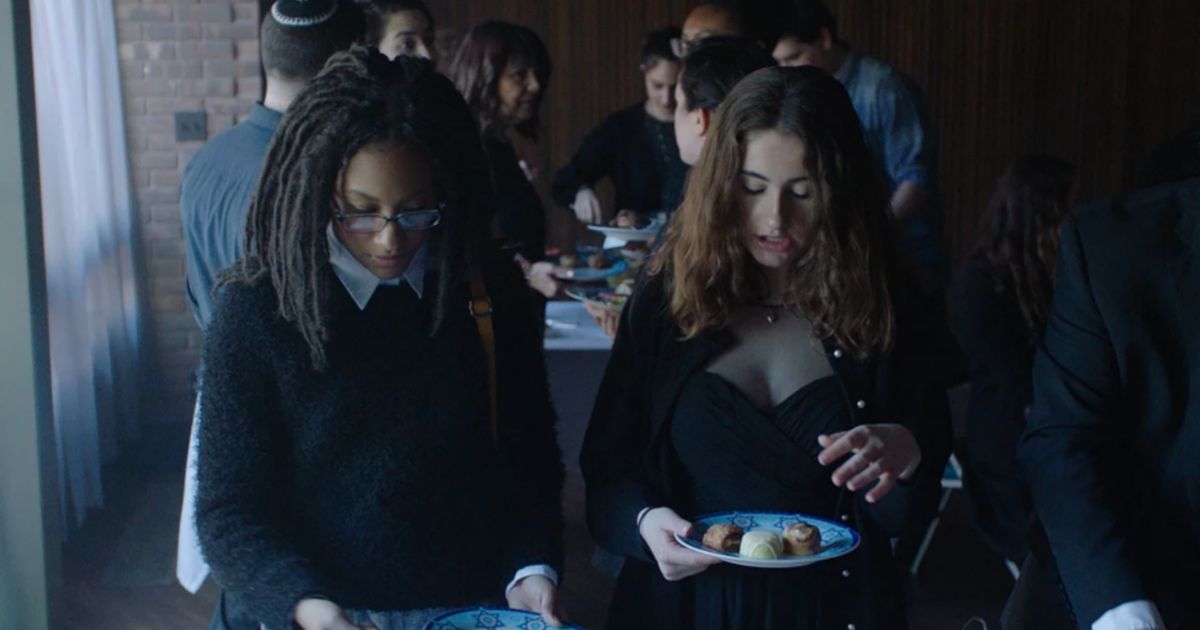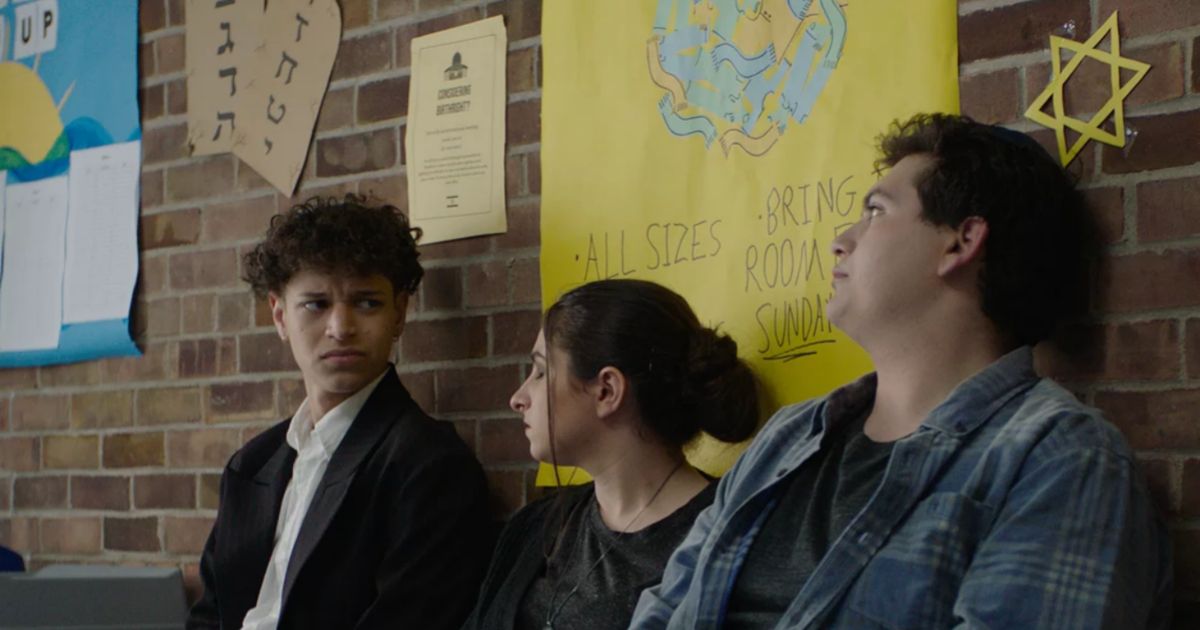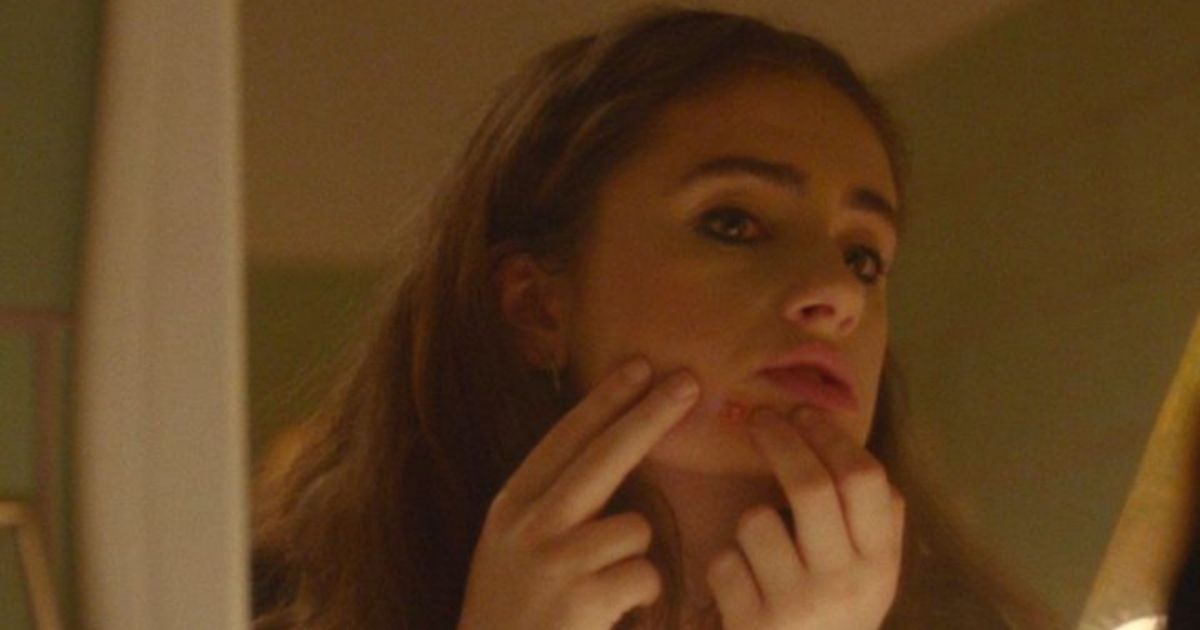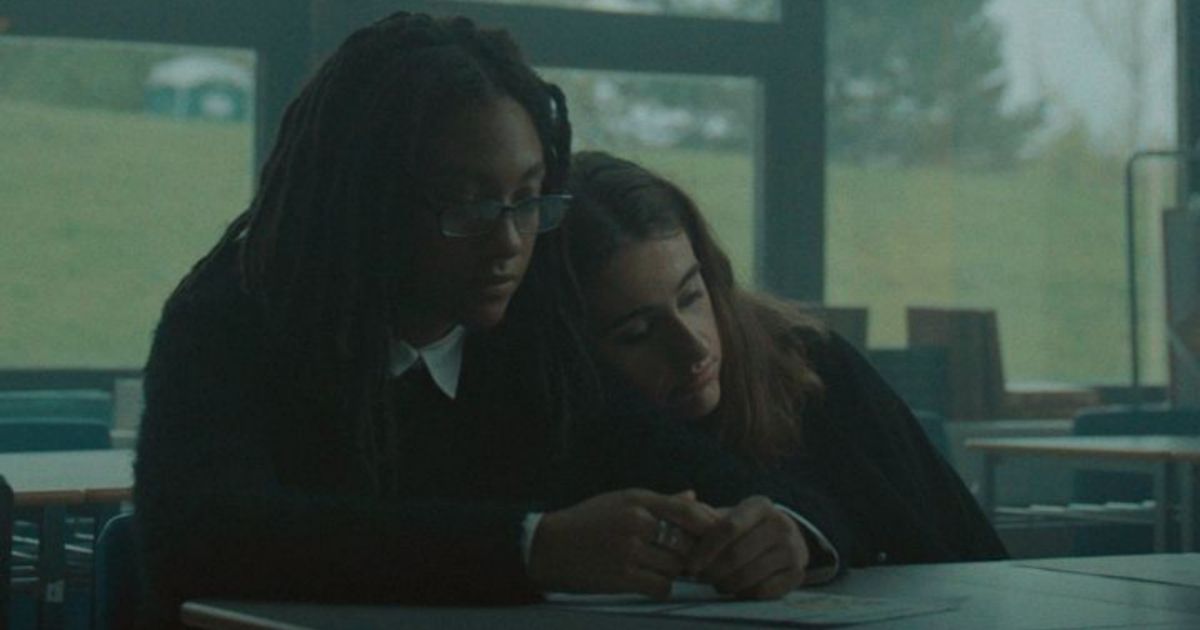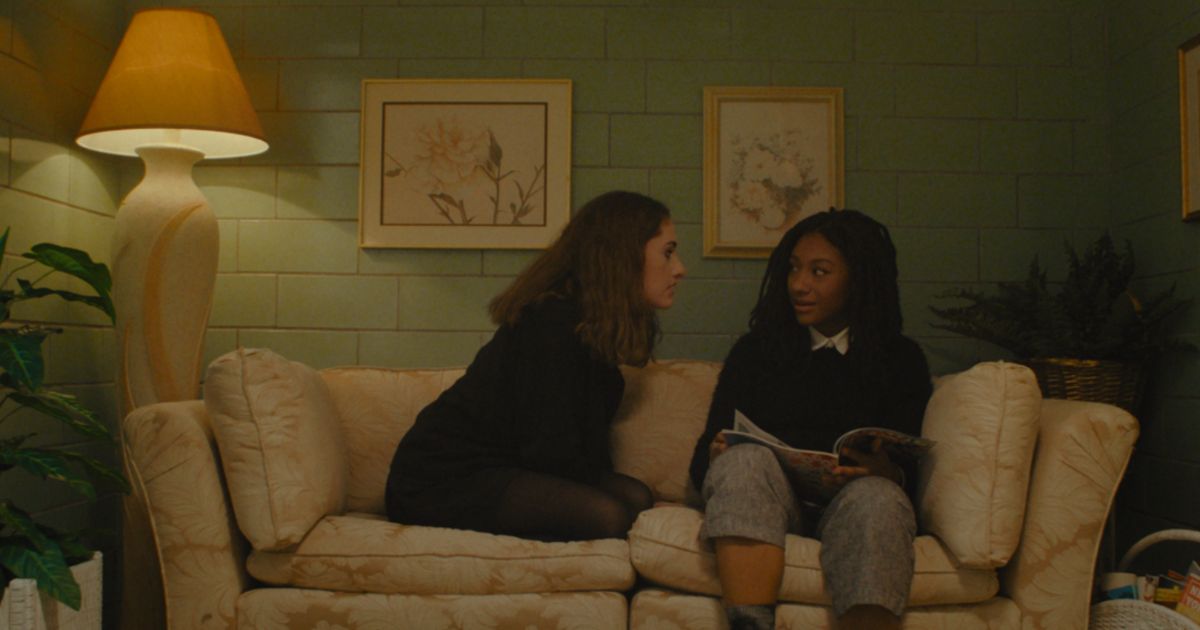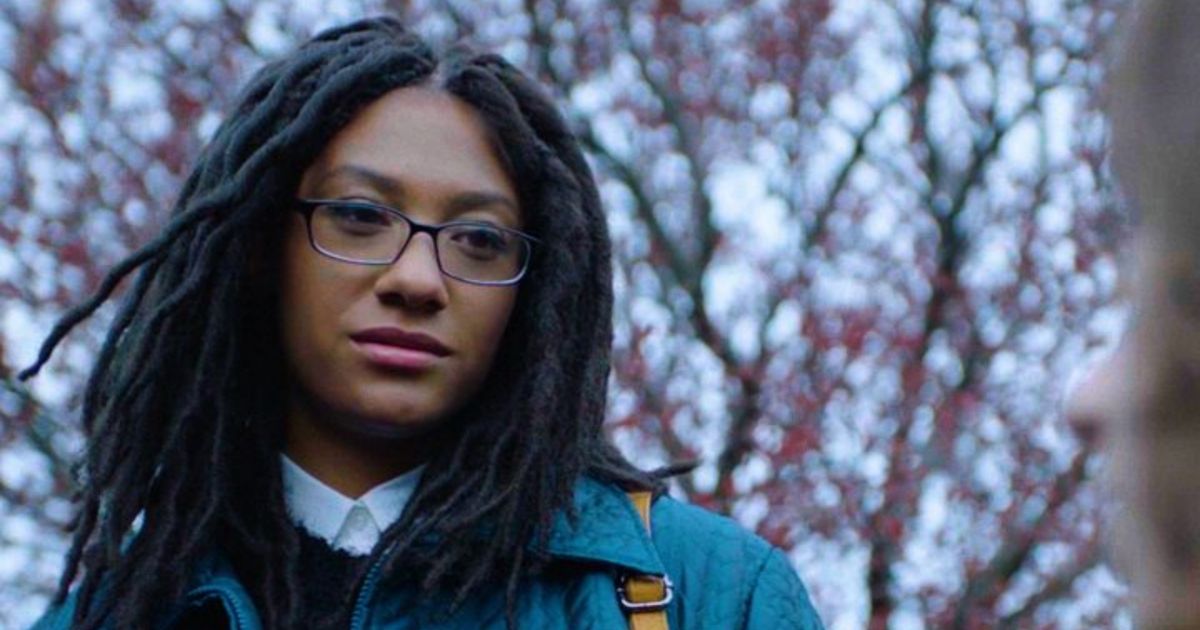Tahara is a unique and insightful film in a cinematic landscape which often isolates voices. It illustrates the creative potential of what certain theorists have termed 'intersectionality,' feminist intersectionality in particular, without being a didactic or proselytizing film. It does this by bringing together different voices in a creative partnership; queer, Jewish, Black, and female perspectives are represented courtesy of the film's thoughtful cast and crew — writer Jess Zeidman, director Olivia Peace, and stars Madeline Grey DeFreece and Rachel Sennott.
The film mainly follows two teenage girls, Carrie (DeFreece) and Hannah (Sennott), during the funeral of one of their classmates in Hebrew school, who died by suicide. After the service, they attend almost a literal after-school special, in which a grief counselor discusses death and encourages the group of Jewish kids to express their feelings. What follows is a subtle character study of teenage epiphanies regarding sex, death, and identity, filled with situations both very funny and quietly sad. Zeidman, Peace, and DeFreece recently spoke with us about Tahara, which will have its theatrical premier at the Quad Cinema in New York City on June 10th, courtesy of Film Movement.
Tahara Intersects the Experiences of Zeidman, Peace, and DeFreece
There's an inherent authenticity to Tahara which is a direct result of its cast and crew. The intersectional intelligence of the film is evident in the fact that these different artists obviously have different experiences and yet collaborated to create something true, not just to each of them individually but to an elusive universality of 'the other,' be it the queer, Black, or Jewish 'other.'
This can be seen in DeFreece's response to a script about a Jewish school (and her reservedly tense but compassionate and excellent performance): "So I'm Black, and I'm queer, but I'm not Jewish," DeFreece said, "I went to public high school, but then I had Sunday school and a very religious family. I didn't grow up with a queer family or really like queer community or any friends that were queer, so I kind of had to discover that on my own terms and navigate that, like feeling very, very alone through that, so there are so many similarities between my experience and Carrie's in the film."
Peace approached it similarly, discovering the fascinating universality of 'the other' in Zeidman's script. "I related to the coming of age as a queer person aspect of it," Peace says, "and I also went to a religious school growing up, so when I read about this Hebrew school, a lot of the things really made sense to me, like I was able to pull from my own memory." For her part, Zeidman's script locates the distinct experience of not just growing up Jewish but growing up itself — she began developing the idea as a late teenager, and the film is ironically mature in explicating authentic teenage experiences as a result.
Jess Zeidman on the Collaboration of Tahara
"I've always wanted to sort of expand the idea of Jewish media," Zeidman says. "I think people have like such a set idea that Jews look and act in a certain way, and I think that doesn't reflect our reality in our communities, and it can be harmful." Finding queer and Black voices within the setting of this Hebrew school is an important way to expand the perspective of Judaism, and the collaborative process between the three artists certainly helped elaborate it; "it was so collaborative," DeFreece emphasizes again. Zeidman continues:
When it came to collaborating with Olivia [Peace], obviously a huge part of their experiences growing up as a Black queer person is being a Black person in predominantly white spaces, and that was something they want to bring to the script. Same goes for Madeline and her amazing performance. And I think that is where we get the layers of our project, because we wanted to make something that reflected our reality but was still, you know, fun to make and fun to watch.
Tahara Has Authentic Fun With the Teenage Experience
Tahara definitely is fun to watch, thanks in large part to Peace's constant restlessness and energy as a director. Peace animates certain scenes of this live-action movie in distinct ways to tell a visual story about the characters; she fluctuates the aspect ratio to mimic the social media world of Instagram most of these teenagers reside in; she films the majority of Tahara in isolating ways, making the most of the predominant aspect ratio (1:1) with cinematographer Tehillah de Castro to box in each character.
"When people are isolated like that on a screen," Peace says, "you can literally only fit like about one and a half bodies there. So you really focus in on what people are saying, how they're looking, and you're not able to see the reaction shot right away. Which I think as a teen, it's really how it feels, like you're very centered in your own narrative." These directorial decisions, in collaboration with Zeidman and the cast and crew, cleverly emulate being a teenager, where "everything feels very devastating," as Peace says.
"We remembered how it felt to feel these things being as big as they are," Zeidman elaborates, "and that really helped the emotion and the energy, both on screen and onset, kind of propel us forward towards something we want to explore [...] it was really cool to have everybody really, not like reverting to teenager-hood, but kind of reflecting it in the process. And I think you can see that in the film." She's right, Tahara is less about the teenage experience than it essentially is the teenage experience: the awkwardness, the tiny apocalypses, the miniature revelations, the hormones and horniness, the dread, and the seeming impossibility of verbalizing how you really feel.
Olivia Peace and Madeline DeFreece on Fostering Collaboration in Tahara
Again, collaboration is the name of the intersectional game here, with each creative personality asking, in DeFreece's words, "how do we make this as authentic as possible?" She goes on, saying "Even getting to know Rachel [Sennott] and working on the relationship between our characters, we just became friends during that time that we filmed, and now our friendship can just grow on screen. So, everything about it was so authentically built off-camera."
Peace, in a moment of delightful incongruity, compares fostering this collaborative space to scenes from the anime series Dragon Ball Z. "There's this like dance that they would do when they fuse," Peace says:
It was kind of literally like that on set, where each person brought their own thing. And then when we came together, the film became a different thing than it was in the scripts, than it was even in my storyboards and the plans I had with our cinematographer, and everyone added their own little experience and things to it. And I think, really, that comes from just being brave enough to change, and accepting that. And as a director, I feel like that's literally my job, to help people be the best versions of themselves in our workplace.
Peace adds an important point here. "This was most people's first feature as well. So it was really important to me to be trying to build self-esteem literally for each person on set," Peace remarks. "I'm pretty proud of that, to be able to foster an environment where people can bring themselves to work. And I think the film turns out cooler because of that."
Tahara Baby
In a very odd turn, Tahara turns out to be the second film with queer themes about two young Jewish women spending the day at a funeral; the other is the uncomfortably funny Shiva Baby which, remarkably, also stars Rachel Sennott. While the two films are incredibly different tonally and artistically, there are sure to be comparisons between the two, with or without any value judgments intended. Some even consider this to be a sign of a New Jewish Cinema.
"Obviously, the comparisons are easy. Jewish, queer, funeral girls — complications," Zeidman jokes. "I love the idea of creating a new era of Jewish cinema. I love it creating more opportunities for queer Jewish films to be told [...] I think what is important to remember is that everything is to service, you know, the idea of conversation. And that's something that art can do, and I think it's important for people to kind of create their own ideas." Zeidman continues:
I've been seeing this week on Twitter, where people are like, "Oh, [Tahara] is the Shiva Baby prequel. Which I think is really weird. But I also think, media wise, we're so trained to like buzzwords and boil things down, and not just take them for the experiences that they are. So I think my frustration only comes from people when they won't give both films space to exist [...] I think it's important to remember that like, both films are indies made with a lot of love, and that if there's room for like, 100 Spider-Man movies, I think we can have two of these.
Making and Sharing Space For More Voices
Zeidman's is a brilliant point that should cancel out any negatively comparative argument; in an age of reboots and countless iterations of the same movie, having two films explore the queer Jewish identities of younger women isn't excessive, it's a blessing. Plus, for the record, it seems as if Tahara was filmed first (it was certainly written first, if one considers Zeidman first developing the script at 19). "I think literally the week that I got home [after filming]," Peace recalls, "Rachel called me and was like, 'Oh, hey, can you talk to my friend, she's directing a film and she'd love to just like pick your brain,' and it was Emma [Seligman, director of Shiva Baby]." Peace goes on:
She's an incredible director. I think the films have very different styles, like we have really different movies that we like. I think it's cool to be in conversation with them, too. They're a really sweet team. Even our production designer, we ended up sharing Jayne [Clarke], the production designer, too. I mean, we're literally all the same age. I think there's like a similar experience that led to maybe the two stories, but then they manifested in very different ways, which I think is so cool, on kind of a cosmic level.
Tahara has a lot to say about a wide spectrum of experiences and identities, but ultimately it's a subtle, sometimes very funny, and intimately relatable movie about friendship, insecurity, sexual awakenings, and the awful, wonderful, and universal experience we all share: growing up. From Film Movement, you can catch Tahara playing at the Quad in NYC June 10th, after which it will branch out to different theaters nationally; you can find more information here.

.jpg)
